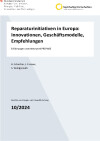Suchergebnisse
Renewable Materials Conference 2024
11. - 13. June 2024
Siegburg/Cologne (Germany) and Online
The Renewable Materials Conference is the place to catch up on innovations and implementations in the field of renewable materials that will shape the future of entire industries.
Reparaturinitiativen in Europa: Innovationen, Geschäftsmodelle, Empfehlungen. Erfahrungen vom Netzwerk PREPARE

Die Europäische Union und viele Länder in Europa haben begonnen einzelne Maßnahmen in Richtung „Erhöhung der Reparaturquote" zu ergreifen. Diese Arbeit erhebt mithilfe von Umfragen und Interviews, die mit Unterstützung von Kontakten des seit fast 30 Jahren existierenden Netzwerks „PREPARE" zustande kamen, solche Maßnahmen in anderen europäischen Ländern – v.a. im Hinblick auf „Best-Practice-Beispiele" und „Lessons learned" – und analysiert ihre Übertragbarkeit auf Österreich.
Schriftenreihe
10/2024
H. Schnitzer, J. Fresner, S. Wohlgemuth
Herausgeber: BMK
Deutsch, 84 Seiten
Downloads zur Publikation
IEA Bericht: Global Critical Minerals Outlook 2024
Neue mittel- und langfristige Prognosen für Angebot und Nachfrage wichtiger Rohstoffe für die Energiewende wie Lithium, Kupfer, Nickel, Kobalt, Graphit und seltene Erden.
Circular Week Tirol 2024
25. - 29. September 2024
Kulturbackstube "Die Bäckerei" und Reich für die Insel Artspace, Innsbruck, AT
Die Circular Week Tirol präsentiert innovative Lösungen für die kreislauffähige Wirtschaft der Zukunft. Sie zeigt Best Practices und stellt Unternehmen sowie Initiativen vor, die Kreislaufwirtschaft bereits jetzt leben.
e-genius Online-Kurs: "Wege in die Kreislaufwirtschaft"
Im neuen Online-Kurs können Sie sich in fünf Wocheneinheiten zum Thema Kreislaufwirtschaft informieren. Im Fokus stehen die Folgen der 'take, make, waste' economy und welche Schritte notwendig sind, um eine Transformation hin zu einer Kreislaufwirtschaft einzuleiten. Der Kurs ist kostenfrei.
Industrie-Impulse: Innovationen stärken - Standort sichern
27. März 2025
Apothekertrakt Schönbrunn in Wien
Heimische Innovationen stärken und somit den Wirtschaftsstandort Österreich zukunftsfit machen – unter diesem Motto steht die Veranstaltung „Industrie-Impulse“.
12. Carbon Capture Forum
24. April 2025
Online
Neuigkeiten aus Forschung, Verwaltung und Industrie
Digitaler Produktpass
2. April 2025
Online (MS Teams)
Erste Teile des digitalen Produktpasses werden bereits in absehbarer Zeit gelten. Beim Webinar werden die neuesten Entwicklungen und Herausforderungen im Zusammenhang mit dem digitalen Produktpass erläutert und aufgezeigt, wie Unternehmen von dieser Innovation profitieren können.
Forum Ressourcenwende 2025
27. - 28. Mai 2025
Kasematten – Bahngasse 27, 2700 Wiener Neustadt
Wie kann Forschung und Entwicklung zur Ressourcenwende beitragen? Im Fokus steht die Wettbewerbsfähigkeit österreichischer produzierender Unternehmen. Das Forum bietet Vernetzung, Informationen, Diskussionen und Firmenführungen.
Infowebinar zum MINT-Studiengang „Nachhaltige Umwelt- und Bioprozesstechnik“
2. April, 30. April und 28. Mai 2025
Online
Die Fachhochschule Technikum Wien stellt an drei Terminen den innovativen, berufsbegleitenden MINT-Studiengang „Nachhaltige Umwelt- und Bioprozesstechnik“ vor.
SUNLIQUID EU-FP7 und LIGNOFLAG H2020-BBI: Umsetzungsprojekte von Zelluloseethanol mit österreichischer Bewertung der Umweltperformance
Das EU-FP7 Projekt SUNLIQUID setzt sich zum Ziel die kommerzielle Reife des sunliquid®-Verfahrens zur Herstellung von Zellulose-Ethanol aus Agrarreststoffen zu bestätigen – einem fortschrittlichen, nachhaltigen und klimafreundlichen Biokraftstoff. Im H2020 Folgeprojekt LIGNOFLAG ist die Errichtung und der Betrieb einer Flaggschiff-Produktionanlage mit einer jährlichen Produktionskapazität von 60.000 t/a Zellulose-Ethanol aus Stroh geplant.
Preisträger:innen des ÖGUT-Umweltpreises ausgezeichnet
Zum 36. Mal hat die Österreichische Gesellschaft für Umwelt und Technik den ÖGUT-Umweltpreis vergeben. In der Kategorie "Klimaneutrale Stadt" ging der Hauptpreis an die WBV-GPA, Schöberl & Pöll GmbH und das AIT für einen sozialen Wohnbau, der zu 100% mit Wärme und Kälte aus erneuerbarer Energie versorgt wird. In der Kategorie "Mit Forschung & Innovation zur Kreislaufwirtschaft" gewann das Projekt SusBind des Kompetenzzentrums Holz GmbH, das einen bio-basierten Klebstoff für Möbelspannplatten entwickelt hat.
Biobasierter Kunststoff Szenario 2050 – Kunststoff aus nachwachsenden Rohstoffen
Als Ergebnis des Projekts BbKs Szenario 2050 liegen eine Publikation mit Handlungsempfehlungen sowie eine Darstellung des Forschungsbedarfs in vier Zeitschritten zur nennenswerten Steigerung des Marktanteils von Kunststoffen auf Basis nachwachsender Rohstoffe vor. Das BbKs Szenario 2050 basiert unter anderem auf dem in einem ersten Schritt des Projekts erhobenen aktuellen Wissensstand zu Biopolymeren inklusive benötigter Rohstoffe sowie auf den zu erwartenden Entwicklungen zu deren Einsatz- und Recyclingmöglichkeiten und gesetzlichen Rahmenbedingungen.
Abfallwirtschafts- und Recyclingkonferenz - Recy & DepoTech
13.-15. November 2024
Leoben
Bereits zum 17. Mal werden sich Vertreter:innen aus Wissenschaft und Wirtschaft treffen, um über aktuelle abfallwirtschaftliche und -technische Themen zu diskutieren.
Recommendations for funding criteria to promote system benefits for medium and large battery storage systems
Market analysis and stakeholder process
Biopolymers and Beyond - Regenerative Kohlenstoffquellen als Perspektive für zukunftsfähige Kunststoffe
1. - 2. April 2025
The Stage, 1220 Wien
Erfahren Sie mehr über innovative Ansätze der Defossilisierung von Kunststoffen, um den Kohlenstoffbedarf von primären fossilen Ressourcen zu entkoppeln.
M-ERA.NET Call 2021 Project Conference
1. - 2. April 2025
Elbflorenz Dresden Hotel in Dresden (D)
The M-ERA.NET network is preparing a conference “Connecting materials innovation actors in Europe and beyond” dedicated to the 70 transnational projects funded under the Call 2021.
Umfrage zu Kreislaufwirtschaft in der Bauwirtschaft – Ihre Meinung zählt!
Die Transformation hin zu einer funktionierenden Kreislaufwirtschaft ist auch in der Bauwirtschaft ein zentrales Zukunftsthema. Mithilfe der Umfrage möchten wir die größten Herausforderungen sowie förderliche Maßnahmen zur Umsetzung der Kreislaufwirtschaft in der österreichischen Bauwirtschaft identifizieren.
Nationales Green Tech Förderungsupdate
7. Mai 2024, 15:00 - 16:30 Uhr
Online
Das Webinar gibt einen Überblick über aktuelle, österreichweite Förderungsmöglichkeiten für grüne Innovationen von Energie- und Umwelttechnik-Unternehmen.
Evaluierung der Machbarkeit einer neuartigen Fertigung von Gewebeschläuchen mit speziellen akustischen Eigenschaften
Mithilfe von schallabsorbierenden Gewebeschläuchen im Ansaugbereich von Verbrennungskraftmaschinen kann das Motoransauggeräusch positiv beeinflusst werden. In diesem Projekt wurde die generelle technische Machbarkeit einer neuen innovativen Produktionsanlage zur Herstellung von akustisch abgestimmten Gewebeschläuchen untersucht.
